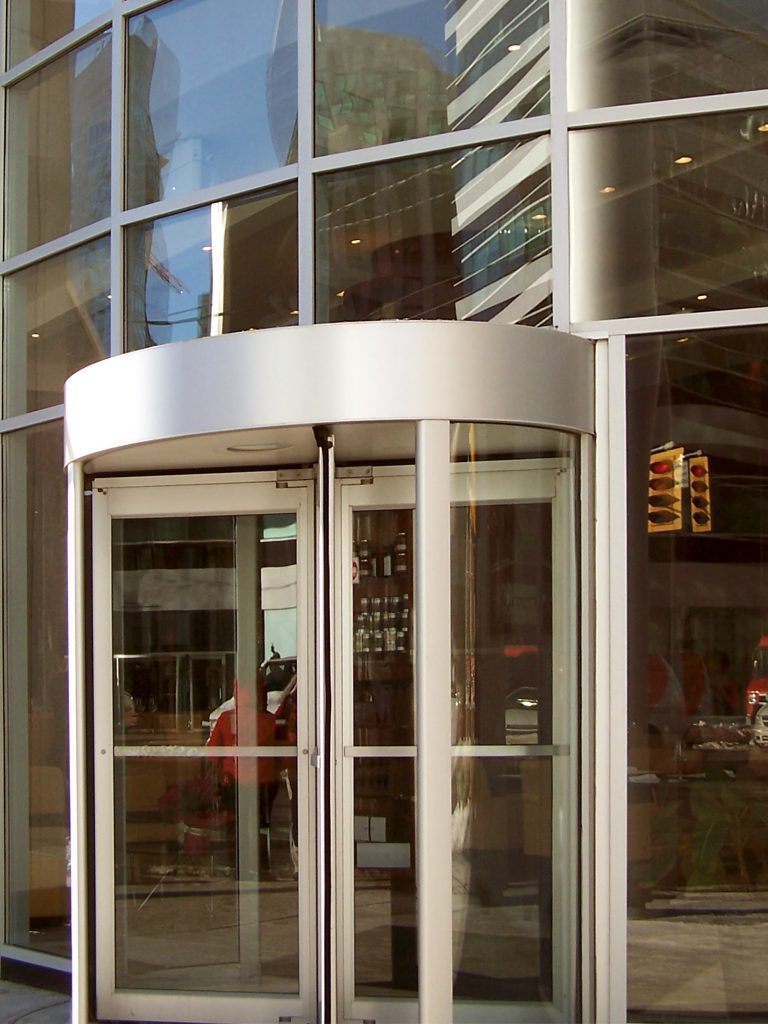
We have all had that moment in a revolving door when the door seems to be moving just a bit too fast. You do your best to keep up but the back of the door knocks into your foot. No harm, no foul when you get a little bump on your foot. But what if an entire glass pane fell off the door and pinned you into the other side of the door. I would expect you would be pretty upset and you would want to figure out who is responsible for your injuries. Is it the hotel, the door manufacturer, the installer of the door? The following case out of New Orleans sheds some light on who might be responsible when a revolving door almost turned into a death trap for one unfortunate man.
In 2004 while working as a courier Huey Madison had deliveries to make at the Inter-Continental hotel in New Orleans, Louisiana. Huey alleged while exiting the revolving door of the Hotel the door panels collapsed and pinned him between the glass causing him injuries. Huey filed a lawsuit claiming damages resulting from the hotel’s failure to properly install, monitor, and repair the revolving door. Intercontinental answered Huey’s lawsuit, denying all claims while also asserting a third-party demand against Carolina Door, claiming Carolina Door had total control over the inspection and repairing of the door in question. Huey subsequently filed an amended petition with Carolina Door listed as a direct defendant.
Both the Intercontinental Hotel and Carolina Doors sought to escape liability by filing motions stating each were solely responsible for Huey’s injuries. These motions are called summary judgments and are standardly filed in cases such as this. If the party who files a summary judgment motion can demonstrate that there are no facts in dispute and according to the law they are not responsible they can evade responsibility. In response to those motions, Huey filed a memo in opposition and attached the affidavit of an expert witness in the field of construction. Huey argued the expert affidavit provided facts in dispute that would defeat defendants’ motion for summary judgment. Carolina Door subsequently filed a motion to strike Huey’s expert affidavit, arguing the introduction of an expert witness was too late and violated court orders. At the hearing on the motions for summary judgment and motion to strike, the trial court held Huey failed to produce factual support concerning negligence by Carolina Door, and thus granted Carolina Door’s motion for summary judgment. The trial court also denied Carolina Door’s motion to strike without much explanation.
 Louisiana Personal Injury Lawyer Blog
Louisiana Personal Injury Lawyer Blog







 You are driving down a highway in Louisiana minding your own business when all of the sudden an eighteen wheeler pulls out of nowhere. BAM, you slam into the side of it, your back aches, your car is wrecked and now you are involved in a lawsuit. Who is at fault for this unfortunate circumstance? While this might seem like a no brainer many times great car accident lawyers will argue that the driver who was just driving down the road somehow caused the accident. The following case out of Port Allen, Louisiana demonstrates how the Courts assess liability when accidents happen between cars traveling down the highway and those that are entering into the highway.
You are driving down a highway in Louisiana minding your own business when all of the sudden an eighteen wheeler pulls out of nowhere. BAM, you slam into the side of it, your back aches, your car is wrecked and now you are involved in a lawsuit. Who is at fault for this unfortunate circumstance? While this might seem like a no brainer many times great car accident lawyers will argue that the driver who was just driving down the road somehow caused the accident. The following case out of Port Allen, Louisiana demonstrates how the Courts assess liability when accidents happen between cars traveling down the highway and those that are entering into the highway.

